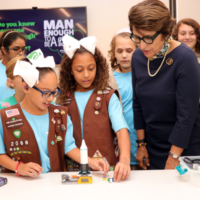Expanding the Pipeline: CRA-WP Research Mentoring at the 2019 Grace Hopper Celebration of Women in Computing – Going Strong and Growing
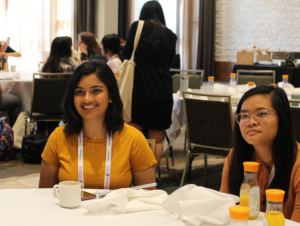 The Grace Hopper Celebration of Women in Computing (GHC) appears to be on track to break attendance records every year. The 2019 conference, held in Orlando, Florida, saw an increase to more than 25,000 participants, up from around 20,000 in 2018. As GHC grows, so does the reach of CRA-WP’s programs at GHC for attendees interested in research and research careers. For undergraduate students exploring research for the first time, graduate students embarking on the path to a research career, academic and research professionals furthering their careers, and industry professionals considering a career change, CRA-WP’s programs make a real impact on many GHC participants.
The Grace Hopper Celebration of Women in Computing (GHC) appears to be on track to break attendance records every year. The 2019 conference, held in Orlando, Florida, saw an increase to more than 25,000 participants, up from around 20,000 in 2018. As GHC grows, so does the reach of CRA-WP’s programs at GHC for attendees interested in research and research careers. For undergraduate students exploring research for the first time, graduate students embarking on the path to a research career, academic and research professionals furthering their careers, and industry professionals considering a career change, CRA-WP’s programs make a real impact on many GHC participants.
CRA-WP’s programming kicked off the morning of Wednesday, October 2nd, with a “welcome and networking” event for around 100 undergraduate CRA-WP GHC Research Scholars. The NSF-funded Research Scholars program started in 2016 and provides funding for research-interested undergraduate students to attend GHC, guidance for finding and navigating the research content at the conference, and three separate events where Scholars can interact with each other as well as meet senior research mentors.
CRA-WP Research Scholars and many others enjoyed the opportunity to talk with mentors at the Mentoring Circles session, where over the course of three hours on Wednesday, they joined small-group 20-minute discussions on specific topics of interest. CRA-WP once again hosted six tables with 12 exceptional mentors at the Mentoring Circles: (1) How to Be Successful Post-Bachelor’s, (2) Is Graduate School for You?, (3) Master’s or Ph.D.?, (4) How to Successfully Apply to Graduate School, (5) What is Computing Research? How Can Undergraduates Participate?, and (6) Research Careers: What Are the Options? How Do I Get There?
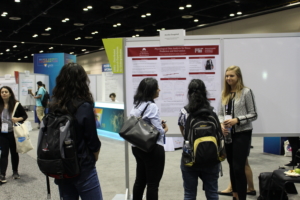 CRA-WP Research Scholars also attended a poster session on Thursday, October 3, that featured research presented by CRA-WP CREU and DREU students. Twenty students who had participated in CRA-WP’s two REU programs – Distributed Research Experience for Undergraduates (DREU) and Collaborative Research Experience for Undergraduates (CREU) – presented their research to conference participants. The student researchers were excited for the opportunity to share their research, and attendees greatly enjoyed the chance to learn, be inspired, and share ideas of their own.
CRA-WP Research Scholars also attended a poster session on Thursday, October 3, that featured research presented by CRA-WP CREU and DREU students. Twenty students who had participated in CRA-WP’s two REU programs – Distributed Research Experience for Undergraduates (DREU) and Collaborative Research Experience for Undergraduates (CREU) – presented their research to conference participants. The student researchers were excited for the opportunity to share their research, and attendees greatly enjoyed the chance to learn, be inspired, and share ideas of their own.
Anna Gommerstadt (Vassar College) and India Irish (Georgia Tech) kicked off the series of CRA-WP mentoring talks at GHC, with the session “I’m a Student Again: Heading to Graduate School After a Break.” Open to all GHC attendees, this talk also served as the opening of the new NSF-funded CRA-WP Returning Scholars program for industry professionals interested in a research-focused career change. With pointers to relevant talks and mentoring circles throughout GHC, the Returning Scholars program culminated in a one-on-one mentoring lunch before the close of the conference.
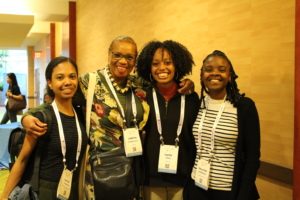 CRA-WP’s programs at GHC extend to participants at all points on the research-career path and our talks and panels were very well attended, with audiences of around 150 per session and more than 1000 in total. Our mentoring talks primarily for graduate students included “It’s a Marathon, not a Sprint: Balancing Work and Life in Grad School and Beyond”, presented by James Mickens (Harvard University) and Kristin Stephens-Martinez (Duke University), “Building Your Academic Professional Network”, by Jaime Moreno (IBM Research) and Ming Lin (University of Maryland at College Park), and “Finding Your Dream Job with a Ph.D.”, with panelists Deb Agarwal (Lawrence Berkeley National Lab), Stefanie Mueller (MIT CSAIL), and Raquel Romano (Threadloom). CRA-WP’s mentoring talks intended primarily for faculty included “Effective Teaching Tactics”, presented by Helen Hu (Westminster College) and Susan Rodger (Duke University), as well as “Building Your Professional Persona”, presented by Andrea Danyluk (Williams College) and Ayanna Howard (Georgia Tech). And for faculty or industry researchers considering a career change, A.J. Bernheim Brush (Microsoft) and Marie desJardins (Simmons University) presented “Mid-Career: Stay, Change, or Retire?” They reprised this in a more intimate setting at the Speakers Corner, where invited speakers led talks and mentoring sessions at the AnitaB.org booth in the Expo Hall.
CRA-WP’s programs at GHC extend to participants at all points on the research-career path and our talks and panels were very well attended, with audiences of around 150 per session and more than 1000 in total. Our mentoring talks primarily for graduate students included “It’s a Marathon, not a Sprint: Balancing Work and Life in Grad School and Beyond”, presented by James Mickens (Harvard University) and Kristin Stephens-Martinez (Duke University), “Building Your Academic Professional Network”, by Jaime Moreno (IBM Research) and Ming Lin (University of Maryland at College Park), and “Finding Your Dream Job with a Ph.D.”, with panelists Deb Agarwal (Lawrence Berkeley National Lab), Stefanie Mueller (MIT CSAIL), and Raquel Romano (Threadloom). CRA-WP’s mentoring talks intended primarily for faculty included “Effective Teaching Tactics”, presented by Helen Hu (Westminster College) and Susan Rodger (Duke University), as well as “Building Your Professional Persona”, presented by Andrea Danyluk (Williams College) and Ayanna Howard (Georgia Tech). And for faculty or industry researchers considering a career change, A.J. Bernheim Brush (Microsoft) and Marie desJardins (Simmons University) presented “Mid-Career: Stay, Change, or Retire?” They reprised this in a more intimate setting at the Speakers Corner, where invited speakers led talks and mentoring sessions at the AnitaB.org booth in the Expo Hall.
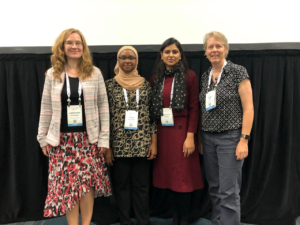 Building a diverse research workforce is very closely tied to building pathways into computing generally, so CRA-WP also presented “How Universities are Creating New Pathways to Diversify Tech,” a panel moderated by Andrea Danyluk, with panelists Valerie Barr (Mount Holyoke College), Carla Brodley (Northeastern University), and Colleen Lewis (Harvey Mudd College).
Building a diverse research workforce is very closely tied to building pathways into computing generally, so CRA-WP also presented “How Universities are Creating New Pathways to Diversify Tech,” a panel moderated by Andrea Danyluk, with panelists Valerie Barr (Mount Holyoke College), Carla Brodley (Northeastern University), and Colleen Lewis (Harvey Mudd College).
CRA-WP enjoys productive collaborations with many groups, and since 2016 has been organizing a session at GHC together with ACM-W and NCWIT. This year, CRA-WP board member Tracy Camp (Colorado School of Mines) co-organized this session on “What Does Success look like? Learn how to make classrooms and workplaces inclusive and welcoming.” In this session – a great complement to the panel on building new pathways – speakers Katherine Lannen and Linda Wu (students at the College of William and Mary), Ed Lazowska (University of Washington), Lucy Sanders (NCWIT CEO), Jodi Tims (ACM-W Chair and Northeastern University), Kim Vorath (Apple), and Tracy Camp (Colorado School of Mines) provided practical and proven resources to assist attendees’ diversity goals.
Many CRA-WP board members work on GHC committees each year, helping to develop, review, and present research-focused content at the conference. A particularly exciting effort that CRA-WP has organized the past two years has been a session highlighting ACM award-winning female researchers. This year’s theme was Cybersecurity and featured three speakers, Aisha Ali-Gombe (Towson University), Alexandra Dmitrienko (University of Wuerzburg), and Shagufta Mehnaz (Purdue University).
Not all computer scientists will choose careers in research, but along with many others, CRA-WP is working to ensure that all computing students know what research is and what research careers look like, that those already in research have the mentoring and support to thrive in their careers, and that researchers doing exciting work are recognized for their contributions. CRA-WP partners with AnitaB.org to offer career advice to thousands of GHC attendees, as well as help ensure these attendees are aware of the other programs that CRA-WP offers. CRA-WP’s programs at GHC would not be possible without the organization, energy, and good humor of CRA staff Erik Russell, Daniela Cardenas, and Alejandra Guzman. They worked tirelessly before, during (especially ensuring that the CRA-WP booth was always staffed), and after the conference.
Details on the CRA-WP sessions at GHC 2019 are available here: https://cra.org/cra-wp/career-mentoring-workshops-at-grace-hopper/.
About the authors:
A.J. Bernheim Brush has been embedded in the Cortana Product Group at Microsoft since January 2016. She spent the previous 11 years in Microsoft Research. Her research area is Human-Computer Interaction with a focus on Ubiquitous Computing and Computer Supported Collaboration (CSCW). Her research has received a 10-year impact award, and several best paper awards and nominations.
Tracy Camp is the Department Head of Computer Science (CS) at Colorado School of Mines (Mines). She joined Mines in 1998, became a Full Professor in 2007, and launched the CS@Mines Department in 2016. Her research is in wireless networking, where she is most known for improving the credibility of wireless networking simulation studies. Dr. Camp is an ACM Fellow, an IEEE Fellow, and passionate about broadening participation in computing.
Sheila Castañeda is Professor Emerita at Clarke University. She enjoyed a 35-year career teaching and chairing the Computer Science department there. She has been a member of CRA-WP for over 20 years and is involved in several other community organizations.
Andrea Danyluk is the Mary A. and William Wirt Warren Professor of Computer Science at Williams College. Her research is in Machine Learning. She is also active in computer science education and was recently named a Distinguished Member of ACM for contributions to computing education. She is passionate about broadening participation in computing and is currently Co-Chair of CRA-WP as well as a member of the Advisory Council of the Center for Inclusive Computing.
Yuqing Melanie Wu is Professor of Computer Science and chair of the Computer Science Department at Pomona College. Her research area is data management, query languages and query optimization. She has been active in promoting diversity and inclusivity in computing, and serves on both the CRA-WP board and ACM-W council.








